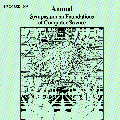In the multiple-selection problem one is given an unsorted array $S$ of $N$ elements and an array of $q$ query ranks $r_1<\cdots<r_q$, and the task is to return, in sorted order, the $q$ elements in $S$ of rank $r_1, \ldots, r_q$, respectively. The asymptotic deterministic comparison complexity of the problem was settled by Dobkin and Munro [JACM 1981]. In the I/O model an optimal I/O complexity was achieved by Hu et al. [SPAA 2014]. Recently [ESA 2023], we presented a cache-oblivious algorithm with matching I/O complexity, named funnelselect, since it heavily borrows ideas from the cache-oblivious sorting algorithm funnelsort from the seminal paper by Frigo, Leiserson, Prokop and Ramachandran [FOCS 1999]. Funnelselect is inherently randomized as it relies on sampling for cheaply finding many good pivots. In this paper we present deterministic funnelselect, achieving the same optional I/O complexity cache-obliviously without randomization. Our new algorithm essentially replaces a single (in expectation) reversed-funnel computation using random pivots by a recursive algorithm using multiple reversed-funnel computations. To meet the I/O bound, this requires a carefully chosen subproblem size based on the entropy of the sequence of query ranks; deterministic funnelselect thus raises distinct technical challenges not met by randomized funnelselect. The resulting worst-case I/O bound is $O\bigl(\sum_{i=1}^{q+1} \frac{\Delta_i}{B} \cdot \log_{M/B} \frac{N}{\Delta_i} + \frac{N}{B}\bigr)$, where $B$ is the external memory block size, $M\geq B^{1+\epsilon}$ is the internal memory size, for some constant $\epsilon>0$, and $\Delta_i = r_{i} - r_{i-1}$ (assuming $r_0=0$ and $r_{q+1}=N + 1$).
翻译:暂无翻译




